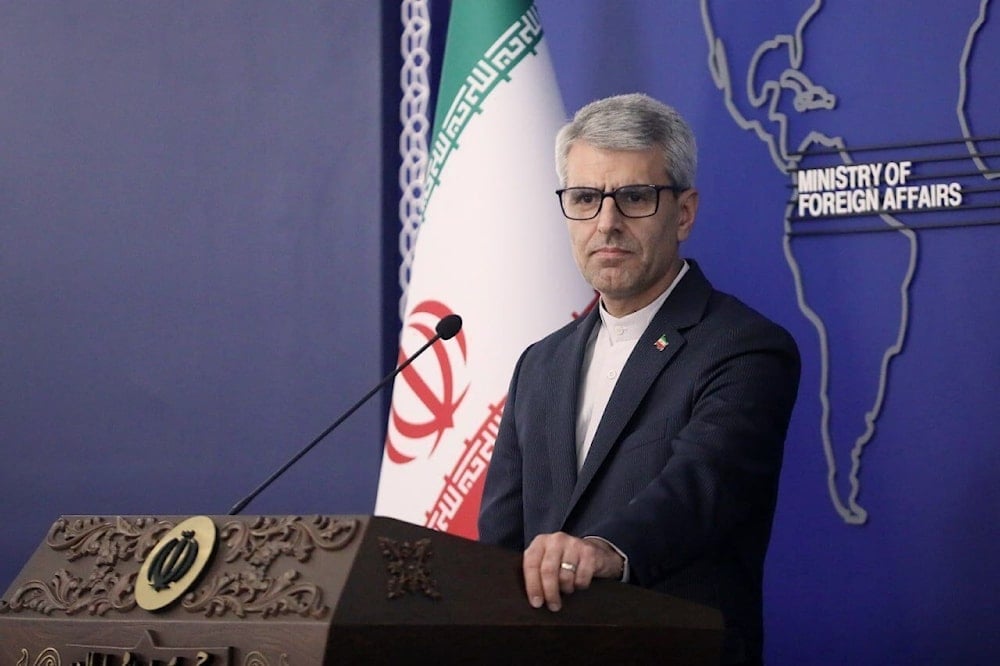Iran denounces Western pressure on IAEA, vows response to resolution
Iran has accused the US and E3 of exerting political pressure on the IAEA to produce a biased report against Tehran, using it to justify a resolution aimed at escalating confrontation over Iran's nuclear program.
-

Iranian Foreign Ministry spokesperson Esmaeil Baqaei (IRNA)
Iran has intensified its criticism of the United States, France, Britain, and Germany, accusing them of leveraging the International Atomic Energy Agency (IAEA) as a political tool to exert pressure on Tehran. The denunciation comes as these countries prepare to table a resolution against Iran at the IAEA Board of Governors meeting in Vienna this week.
Speaking at his weekly press conference on Monday, Iranian Foreign Ministry spokesperson Esmaeil Baqaei asserted that the Islamic Republic has upheld its commitments under the Non-Proliferation Treaty (NPT) and the Comprehensive Safeguards Agreement, while the West has manipulated the agency to serve geopolitical goals.
Report manipulation
According to Baqaei, "the IAEA decided to first prepare a report under the political pressure and influence from the Western countries, and subsequently the same countries abused that report." He reiterated that there was no indication in the report of Iran's nuclear program straying from peaceful objectives.
Western diplomats have indicated that the resolution, if adopted, would mark the first formal censure of Iran in nearly 20 years. It reportedly accuses Tehran of non-compliance with safeguards obligations, citing concerns about uranium enrichment levels and transparency.
In response, Iranian officials have delivered stern warnings to both Washington and the European trio. According to diplomatic sources cited by Al Mayadeen, Tehran communicated through intermediaries that any move to adopt a resolution would be viewed as a coordinated act of aggression, with the United States held equally responsible. Iranian authorities reportedly warned that such escalation would derail ongoing indirect negotiations aimed at reviving the 2015 nuclear deal.
Enrichment sovereignty
Baqaei noted that Iran would not seek permission from foreign powers to conduct uranium enrichment, noting, "This right is explicitly recognized for member states and is non-negotiable under Article 4 of the NPT." He argued that enrichment activities are not synonymous with weaponization, and pointed out that several US allies conduct enrichment programs without facing international scrutiny.
Tehran has also warned that the resolution could be interpreted as an effort to trigger the UN's snapback mechanism, which would reinstate sanctions lifted under the Joint Comprehensive Plan of Action (JCPOA). "This would completely change the equations," Iranian sources told Al Mayadeen, referring to the nuclear file's trajectory. Iranian officials have hinted that continued pressure could prompt a reassessment of cooperation levels with the IAEA.
Diplomatic deadlock
Despite rising tensions, Baqaei indicated that Iran remains open to diplomacy. However, he described a recent US proposal conveyed via Oman as unsatisfactory: "The proposal neither had the characteristics of active and bilateral negotiations nor was it the outcome of the indirect Iran-US talks held so far." He noted that Iran is drafting its own "reasonable, logical, and balanced" proposal.
Baqaei also addressed increasing hostility from Europe. "The confrontation with European countries cannot in any way create an incentive for cooperation," he said, blaming European governments for abandoning diplomacy and escalating confrontation.
Read more: Exclusive: Iran warns US, EU over potential IAEA nuclear resolution
Touching on talk of a potential snapback of sanctions, Baqaei dismissed the idea as legally groundless. He argued that there is no justification to escalate Iran's nuclear file to the UN Security Council given that "Iran's nuclear program is completely peaceful."
He also criticized President Donald Trump's executive order restricting entry for citizens of countries including Iran, labeling it "discriminatory and racist." The move, he said, violates human rights and principles of justice and equality.
Gaza betrayal
Turning to the humanitarian crisis in Gaza, Baqaei condemned the ongoing Israeli genocide and pointed to the failure of international bodies to act. He particularly singled out the United States for vetoing a recent UN Security Council resolution calling for an immediate ceasefire. "Washington's stance once again proved its backing for Israel and granting its officials impunity for gross human rights violations," he said.
Baqaei concluded by urging the global community to intervene immediately to stop the worsening situation in the occupied Palestinian territories, warning that silence enables continued atrocities.

 4 Min Read
4 Min Read









